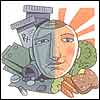|
|
|
MSN FREAK: Lakewood Malls CEO Sushil
Dungarwal loves MSN's emoticons
|
Vineet
Nayyar, the 42-year-old CEO of HCL Comnet is that strange breed:
a tech CEO who hates two of tech's most visible manifestations,
mobile phones and e-mail. E-mail, he argues, has stopped people
from thinking. Not surprisingly HCL Comnet is a no-e-mail zone:
all mail, internal and external is blacked (or more appropriately,
blocked) out. But what of clients, or potential ones that wish to
contact the organisation through mail? Well, senior execs, like
Nayyar himself, are exempt from the rule, (Égalite, where
are you?) and the sales team can access e-mail after 4.00 p.m. everyday.
Nayyar and his colleagues communicate with
each other using an intranet-based chat system called Knockout.
"I found that with e-mail, the employees were always locked
to their workstations. If a meeting had to be organised, nearly
50 correspondences took place and if someone wanted a small change
in the timing, another 100 mails flew out," says the man.
Nayyar's distaste of e-mail extends out of
work too, where the Yahoo Messenger is the easiest way to catch
up with him. Several of his friends from his XLRI days (class of
1985) are on his buddy list which numbers 200. "At least 5-10
of them are logged on at any time," he says.
Sameer Koticha, Executive Director at Mumbai-based
brokerage ASK Raymond James, is a Yahoo Messenger junkie too, and
he puts it to good use for official purposes. At work, all 15 senior
execs at the brokerage are always logged on. "Messenger speeds
up the communication process tremendously," says Koticha. And
speed does matter if you're dealing with stocks. Still, Koticha
belongs to the minority of instant messaging fans that uses an internet-based
public messenger for communicating@work. Among this minority is
R.K. Saboo, Deputy Managing Director of First Flight Couriers, an
msn Messenger fan who has managed to convince his employees that
it's a personal, yet economical way of keeping in touch with customers
within the country and without.
The majority prefers intranet-based messengers
or chat engines their companies have developed. Anand Sudarshan
is one such. The 42-year-old CEO of Netkraft, a Bangalore-based
software company, prefers a chat platform called Jabber that the
company has developed. He uses it to interact with over a 100 employees
of his working onsite in the US and Europe. And he's almost always
logged on to the msn Messenger service, which he uses for rapid
chats with old pals who are CEOs and senior execs to discuss, amongst
other things, business. "There have been instances where I've
helped my friends arrive at the right valuation for acquisitions
they were working on," grins Sudarshan.
Susil Dungarwal, CEO, Lakewood Malls Pvt. Ltd.,
the retail venture of the Mumbai-based Hiranandani Group, is by
his own admission an msn instant messenger freak. He prefers the
company's internal messenger while at office, but when on the road
(and that's 15 days a month) it is good old msn Messenger he turns
to. And the emoticons (it allows you display emotions) feature fascinates
him. "They help convey the mood and message in the fast and
precise manner," he says. And as Agnel Victor, Vice President
(HR) at Kotak Securities, points out some instant messengers are
compatible with mobile phones. For tech jocks that's something like
the best of two worlds at once.
-By T.R. Vivek
and Dipayan Baishya
HEALTH
NOTES
Karoshi, Anyone?
Fine, death from overwork (Karoshi
in Japanese, for where else but in a nation of salarymen could such
a term have originated?) doesn't feature on our list, but here are
the 10 most common executive ailments directly arising from today's
high-stress work environments
Hypertension: Temper on a hair-trigger?
Smallest mistake by one of your direct reports enough to upset you?
Congratulations, you are the proud owner of a blood pressure (BP)
gone wild. "Stress at work leads to high BP in most execs,"
says Dr. Uday Khanolkar, a cardiologist at Bangalore's Sagar Apollo
Hospital. "It's simply the result of not keeping one's cool
when the work is demanding." The result: heart attacks.
Stress-induced headache:
Ever wondered why you always seem to have a headache? Blame
it on the Big S, says Dr. Sridhar Peddy, a cardiologist at Hyderabad's
Apollo Hospital. "Tension headaches happen when you feel incapable
of handling too much work; fear of failure forces you to be too
hard on yourself."
Migraine: True, no one knows what really
causes a migraine, leave alone have a cure for it. However stress,
anger, smoking, and lack of sleep could act as triggers.
Neck pain: Working
on the computer for too much time at one stretch can be a real pain
in the neck. "Although this ailment is common among software
professionals and those who work on the computer, it isn't restricted
to them," says Khanolkar. "People who sit in their chairs
all day long in the wrong posture are as prone."
Hyperlipidimia: Nope, this has nothing to do
with libido; instead, it has everything to do with fat. Eating junk
food is a natural human response to combatting stress. Unfortunately,
this results in fat deposits building up in blood vessels, lower
energy levels, and possible heart disease.
Coronary Artery Diseases
(CAD): Stress and an unhealthy diet (face it, most execs
eat dumb) combine to cause cad. All those long hours spent meeting
impossible deadlines ("let's get some pizza in, we have to
finish this today") could one day cause atypical chest pain
(ACP), and arteriosclerosis.
Diabetes: Once attributed exclusively
to errant genes, new studies indicate that unhealthy lifestyles
(including stress) in anyone over 35 could cause diabetes.
Acid Peptic Diseases (APD):
A micro-organism, heliobacter pylori, is the cause of APD,
but execs have found a way around this one. Most pop pills (aspirin
is the most common) to combat headaches, and painkillers such as
aspirin, ibuprofen, and naproxen promote ulcers.
Gastro-esophageal Reflux Disease (GERD):
A kind of APD, gerd causes inflammation and bleeding of the
stomach and oesophagus leading to difficulty in eating and swallowing,
pneumonia, hiccups, and involuntary movements of the head and neck.
"Surely, all those hours spent on an empty stomach because
you had to finish that presentation were bound to take their toll,"
says Peddy.
Addiction: Coffee,
tea, cigarettes, the routine post-work sundowner... need we say
more?
-Ananya Roy
HEALTH
SNIPPETS
 DON'T
SNEEZE. SMILE! DON'T
SNEEZE. SMILE!
Research at the Carnegie Mellon University has shown that happy
people are less likely to catch a cold. Writing in a recent issue
of Psychosomatic Medicine researcher Sheldon Cohen says "study participants
with a positive emotional style weren't infected as often and experienced
fewer symptoms compared to people with a negative emotional style".
Go ahead, be happy.
 WONDER
C WONDER
C
Here's more on ascorbic acid, that wonder vitamin commonly tagged
with the letter C. Recent studies show that diets rich in Vitamin
C reduce the risk of strokes and ulcers. Given that the vitamin
helps build immunity to colds, this makes it truly versatile. What's
next, we wonder?
|
